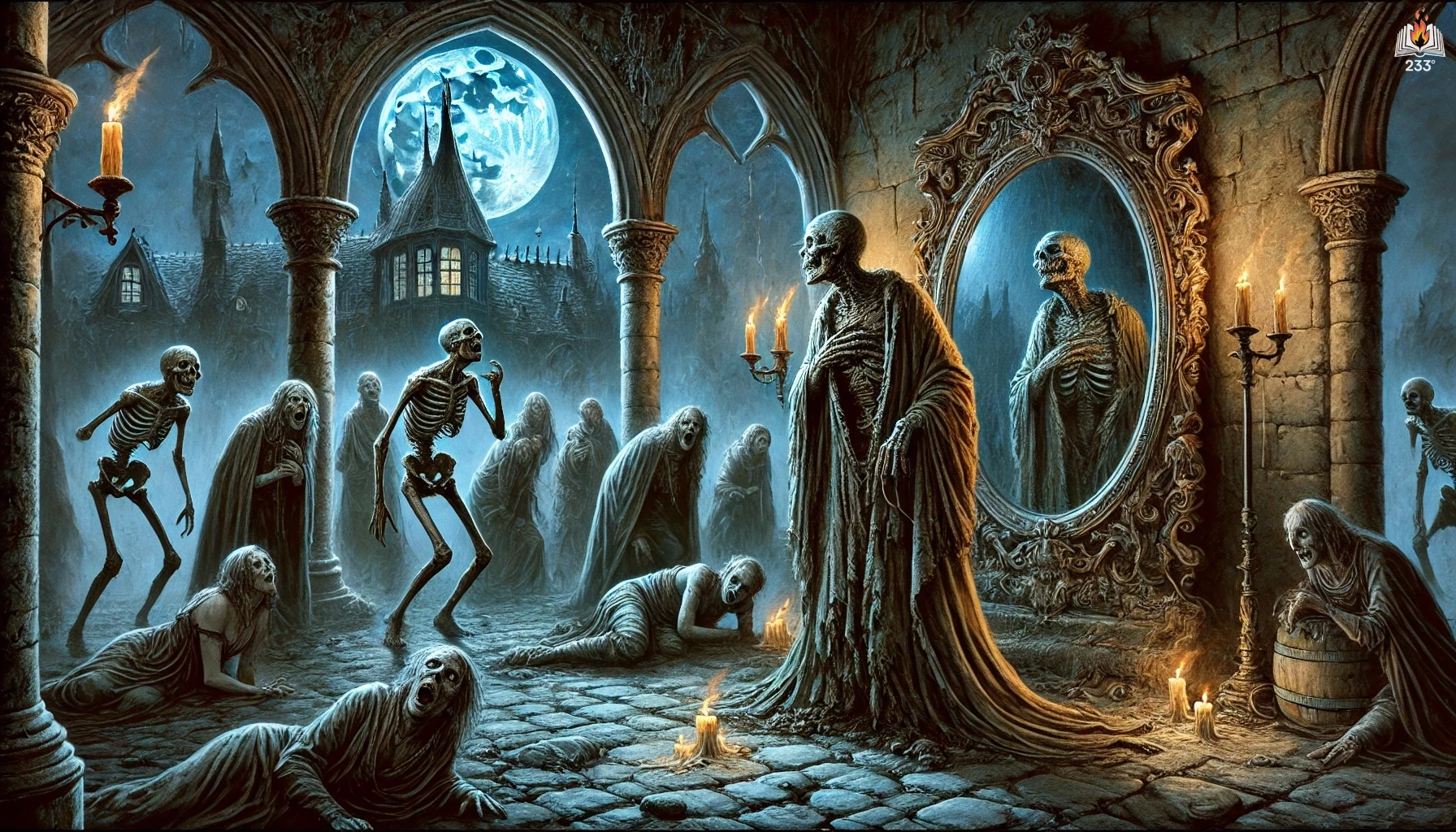Hercule Poirot’s Christmas by Agatha Christie, published in 1938, is part of the celebrated Hercule Poirot series, where the meticulous Belgian detective is called to solve a brutal murder during a holiday family gathering. The novel is often regarded as one of Christie’s most ingenious locked-room mysteries, delivering both festive charm and chilling intrigue.
Plot Summary
Snow fell lightly over Gorston Hall, frosting the ancient brickwork and muffling the crackling tension within. Simeon Lee, a rich old tyrant with diamond-sharp eyes and a cruel laugh, had summoned his family home for Christmas. His sons came reluctantly: Alfred, the loyal but cowed eldest; George, the pompous parliamentarian; David, the sensitive artist; and Harry, the black sheep who had fled England long ago. Into this simmering cauldron arrived Simeon’s granddaughter, Pilar Estravados, a dark-eyed beauty from Spain, bringing an air of mystery and foreign charm.
The house bristled with old grievances. Alfred and Lydia held the household together with quiet diligence, though Lydia watched the unfolding drama with wary detachment. George’s wife, Magdalene, floated on her own polished vanity, while David’s wife, Hilda, provided her husband a firm anchor against past wounds. Harry’s sudden arrival rattled the family – his reckless charm and sharp tongue rekindled old jealousies and resentments.
Simeon, once a diamond magnate of ruthless ambition, sat at the heart of it all like a spider in his web. Though aged and frail, his mind was keen, his tongue sharper still. He delighted in stirring discord among his heirs, watching them squirm beneath his gaze. He had summoned them, he claimed, out of sentimentality, but as they gathered beneath the Christmas decorations, it became clear to all that Simeon Lee had a final game in mind.
The air grew brittle with unease. Simeon revealed his plans to change his will, suggesting his fortune might fall into unexpected hands. His taunts sliced through the holiday trappings, leaving raw nerves exposed. That night, the house trembled with tension. Simeon retreated to his locked room, clutching a bag of uncut diamonds, while his family fumed below.
Then came the scream – high, thin, and terrible – shattering the Christmas calm. When the family burst into Simeon’s room, they found him brutally slain, his throat slit, the diamonds scattered across the floor like frozen stars. Blood pooled on the rich carpet, and the bolted door gave the murder an impossible air.
Superintendent Sugden arrived, efficient and thorough, but with him came a small man with a pointed mustache and egg-shaped head: Hercule Poirot. Poirot, a guest of Colonel Johnson nearby, had been asked to attend almost as an afterthought. Yet his keen gaze missed nothing, and he soon took quiet command of the inquiry.
Poirot moved through the household with graceful patience, listening to grievances and confessions, reading the flickers behind every polite word. He learned that Simeon had delighted in cruelty all his life. Alfred had been crushed beneath his father’s thumb; George had schemed for money; David had fled after witnessing his mother’s pain; Harry had squandered his share in youthful rebellion. Even sweet Pilar carried a knife-edge smile, a survivor’s charm honed by war. Only Hilda, strong and steady, and Lydia, cool and perceptive, seemed immune to the old man’s poison.
The locked room puzzled everyone. The windows were barred, the door bolted from within. Yet Simeon lay butchered, his diamonds untouched. Poirot listened, observed, and gently stirred the waters. He noted that Pilar, so vivid and alive, occasionally stumbled over the simplest English customs. He questioned why Harry’s return had been so sudden, why David flinched at his father’s name, why George clutched at his reputation so tightly.
Then came another shock – Pilar was not Pilar. The real Pilar had died in Spain; this young woman was an imposter, claiming her place in the family for reasons of her own. But she had not killed Simeon. Her deception ran alongside the crime, a shadow moving through a darker storm.
Poirot turned his attention to Superintendent Sugden, the solid, unremarkable policeman. Quietly, Poirot uncovered the truth that had escaped all eyes. Sugden was Simeon Lee’s son, born of a long-forgotten affair and denied his place among the legitimate heirs. He had come to claim his inheritance, not through the will, but with a razor. It was Sugden who had killed Simeon, rigging the door’s bolts with a trick, creating the illusion of a locked-room mystery. His motive was not greed alone, but a lifetime of resentment, sharpened by rejection and shame.
Poirot gathered the family, as was his custom, in the drawing room where so many bitter words had flown. With calm precision, he laid bare the tangled skein of motives and lies, the jealousies and grievances that had brewed beneath the family roof. As Sugden’s mask cracked, the room seemed to exhale, as though the house itself had held its breath.
With the murderer unmasked, the Lees were left to face the emptiness their patriarch had left behind. Alfred and Lydia, bound by quiet loyalty, looked at each other with a new understanding. George, deflated but unharmed, drifted back toward his political life. David and Hilda, their old wounds freshly exposed, found a kind of peace in survival. Harry, restless as ever, prepared to drift once more, carrying with him the weight of old rebellions. Pilar, the bold imposter, stood revealed but unashamed, her audacity quietly admired by the detective who saw all.
Poirot, with his little smile, took his leave. Outside, the snow fell again, softening the hard edges of Gorston Hall. Inside, the Lees gathered awkwardly, uncertain of how to fill the hollow left by Simeon’s cruel spirit. Christmas had come and gone, leaving in its wake not peace, but the delicate beginnings of it – the chance to break old patterns, should they dare to take it.
Main Characters
Hercule Poirot – The brilliant and methodical Belgian detective known for his keen observation and “little grey cells.” Invited almost by accident, Poirot brings an outsider’s perspective, dissecting family tensions and false alibis with elegance and patience.
Simeon Lee – The wealthy and tyrannical patriarch whose murder sparks the investigation. A manipulative and cold man, Simeon delights in stirring conflict among his heirs, and his violent death is both shocking and fitting for his tempestuous character.
Alfred Lee – Simeon’s dutiful but overshadowed eldest son. Loyal to the family, Alfred struggles under his father’s domineering shadow and harbors deep-seated frustrations that make him a suspect when the old man is found dead.
Lydia Lee – Alfred’s calm and intelligent wife, who acts as the emotional anchor in the household. She exudes quiet strength and becomes a perceptive observer of the unfolding drama.
George Lee – A pompous and politically ambitious son, George is self-serving and preoccupied with wealth and status, providing a motive when Simeon threatens to cut the family off.
Magdalene Lee – George’s vain and calculating wife, skilled in social maneuvering and not above manipulation, which puts her under Poirot’s scrutiny.
David Lee – The artistic and sensitive son, long estranged from his father over past grievances. David’s passionate nature and wounded pride place him in the circle of suspicion.
Hilda Lee – David’s devoted and practical wife, who quietly supports her husband and harbors her own sharp insights into the family tensions.
Harry Lee – The black sheep of the family, charming yet reckless, whose return after a long absence stirs old resentments and suspicion.
Pilar Estravados – Simeon’s Spanish granddaughter, vivacious and mysterious, who captivates the household but holds secrets of her own.
Superintendent Sugden – The local police officer in charge of the case, diligent but conventional in his methods, offering a foil to Poirot’s unorthodox brilliance.
Theme
Family Dysfunction and Greed: The novel dissects the corrosive effects of wealth and control within a family, where old grievances, jealousy, and materialism fester beneath a veneer of holiday civility. The clash between the father and his children over inheritance underscores the moral rot at the heart of the Lee household.
Deception and Identity: Masks and hidden motives pervade the narrative, with characters concealing past wrongs, false alibis, and secret desires. The theme extends beyond criminal deception to emotional disguises, as each character projects a carefully managed image.
Justice and Retribution: Poirot’s investigation explores not only legal guilt but moral responsibility. The murder is not just a crime against a man but a reckoning for years of cruelty, raising questions about justice both inside and outside the law.
The Holiday Facade: Set against the backdrop of Christmas, the novel explores the tension between festive appearances and underlying discord. Christie cleverly uses the Christmas setting to heighten the irony and pressure cooker atmosphere.
Writing Style and Tone
Agatha Christie’s prose in Hercule Poirot’s Christmas is crisp, accessible, and filled with sharp, economical dialogue that balances humor, tension, and insight. Christie’s use of the omniscient narrator allows readers to witness the unfolding drama from multiple angles while skillfully withholding key details to maintain suspense. Her talent for laying red herrings and subtle clues keeps readers engaged and guessing.
The tone masterfully blends cozy English country house charm with dark undercurrents of malice and psychological tension. Christie infuses the narrative with a sly wit, particularly through Poirot’s observations, and tempers the grimmer elements of murder with moments of levity. Despite the brutal nature of the crime, the novel remains elegant rather than lurid, making it a quintessential Christie mystery that balances brutality with decorum.
We hope this summary has sparked your interest and would appreciate you following Celsius 233 on social media:
There’s a treasure trove of other fascinating book summaries waiting for you. Check out our collection of stories that inspire, thrill, and provoke thought, just like this one by checking out the Book Shelf or the Library
Remember, while our summaries capture the essence, they can never replace the full experience of reading the book. If this summary intrigued you, consider diving into the complete story – buy the book and immerse yourself in the author’s original work.
If you want to request a book summary, click here.
When Saurabh is not working/watching football/reading books/traveling, you can reach him via Twitter/X, LinkedIn, or Threads
Restart reading!








